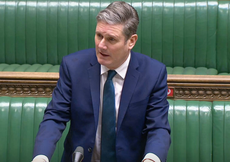Keir Starmer risks Labour being portrayed once again as the party of tax, spend and borrow
The topics the Labour leader chooses to debate are all important, but it’s what you do when you are opposing a government you don’t really disagree with

Your support helps us to tell the story
From reproductive rights to climate change to Big Tech, The Independent is on the ground when the story is developing. Whether it's investigating the financials of Elon Musk's pro-Trump PAC or producing our latest documentary, 'The A Word', which shines a light on the American women fighting for reproductive rights, we know how important it is to parse out the facts from the messaging.
At such a critical moment in US history, we need reporters on the ground. Your donation allows us to keep sending journalists to speak to both sides of the story.
The Independent is trusted by Americans across the entire political spectrum. And unlike many other quality news outlets, we choose not to lock Americans out of our reporting and analysis with paywalls. We believe quality journalism should be available to everyone, paid for by those who can afford it.
Your support makes all the difference.If you want to know how much trouble Keir Starmer is in, look at the four subjects he has chosen to debate in the opposition’s time in the House of Commons. Last Monday, it was universal credit and free school meals; this Monday it will be council tax and employment rights.
These are all important subjects, but they are opposition by numbers. They are what you do when you are opposing a government you don’t really disagree with.
Labour’s motion on universal credit will probably turn out to be the most successful of the four, in that it persuaded six Conservative MPs to vote with the opposition in demanding that the £20-a-week increase in payments be continued beyond April, when it is due to expire.
But Rishi Sunak is going to extend the payments anyway. It is puzzling that he hasn’t agreed to it already, but that seems to be an internal debate in the government about timing, not principle. What is more difficult for Starmer is what happens next, because the chancellor is going to refuse to make the £20-a-week extra permanent.
I think he should make it permanent. Benefits are too low in Britain, and the coronavirus crisis has exposed that; but ultimately, higher benefits have to be paid for by higher taxes – a subject to which Starmer is going to turn next. He knows that while extending the emergency level of support is not only popular but something the government is going to do, extending it indefinitely is not. More voters (47 per cent) think the higher rate should end either in April or after “a while longer” than think the increase should be permanent (36 per cent), according to an Opinium survey this week.
More politics by numbers on Monday, when Starmer has a motion on the Commons order paper calling on Boris Johnson to drop the increases in council tax that are due in April. Again, Labour has a strong short-term argument: the “middle of a pandemic” is the wrong time to raise taxes. Actually, we all hope it will be near the end of the pandemic: what the opposition means is that the middle of a post-coronavirus recession, with unemployment still rising, is the wrong time to put up taxes.
Labour is entitled to point out that Sunak is guilty of sharp practice in raising council tax. What the chancellor has done is to “allow” local councils to put up the property tax by 5 per cent, while squeezing central government funding. That means he is in effect forcing them to put up local taxes, with a further presentational device of claiming that most of the increase is to pay for social care, because everyone is in favour of spending more on social care.
The Conservatives, in response, are entitled to accuse Labour of electioneering. The local elections are coming up – provided they are not postponed again – and that means ritual exchanges in the Commons about which party is best at keeping council tax down.
In fact, both parties agree that now is not the right time to raise taxes. Sunak is wrong to raise taxes and wrong to pretend he isn’t by forcing local councils to do it for him. So Labour will once again be in the right, but will lose the vote on Monday.
All of this is a waiting game, however, until the real decisions have to be made about raising taxes. At the moment, Labour can happily call for more public money to be spent, knowing that it can be paid for out of borrowing. Shadow ministers never have to say that bit, and are rarely challenged on it, because the government has borrowed so much over the past year that another few billion here or there seems immaterial.
Yet the bills for Labour’s opposition by numbers will have to be accounted for at some point. At some point it will become the right time to raise taxes. That is why Anneliese Dodds, the shadow chancellor, currently has the hardest job in British politics. Every day her leader and her shadow cabinet colleagues call for large amounts of extra government spending and she has to give speeches about value for money. Her focus is on the presbyterian virtue of thrift – “Some of my family were Plymouth Brethren, you know,” she’s been known to say – which is why she attacks the government for wasting money on test and trace and PPE.
Yesterday she was reduced to criticising Sunak for his “repeated tinkering with economic support”, which has “left employers unable to plan”.
It feels as if Labour is marking time before another classic electoral contest in which it is portrayed as the party of tax, spend and borrow. “No more tinkering” is not going to be good enough as an election slogan in response.




Join our commenting forum
Join thought-provoking conversations, follow other Independent readers and see their replies
Comments